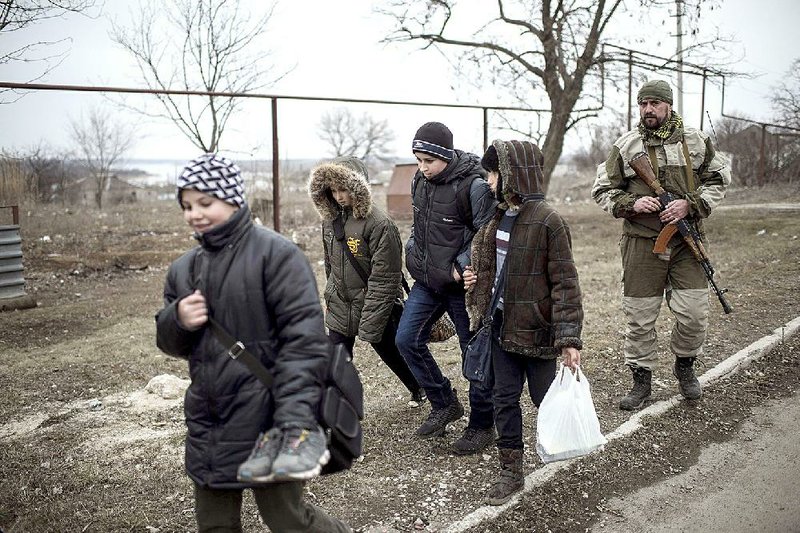KIEV, Ukraine -- Warring parties in Ukraine took a major stride toward quelling unrest in the country's east Thursday with the declared start of a supervised withdrawal of heavy weapons from the front line.
Ukrainian and pro-Russia separatist officials have noted a sharp decline in violence, although the chances of long-lasting peace remain clouded by lingering suspicions.
While announcing the pullback, Ukraine's Defense Ministry warned that it would revise arms-withdrawal plans in the event of any attacks.
"Ukrainian troops are in a state of total readiness to defend the country," it said in a statement.
The pullback was supposed to have started more than a week ago under a peace deal agreed upon earlier this month by the leaders of Russia and Ukraine to end the fighting, which has killed nearly 5,800 people since April. The intensity of fighting has declined notably in recent days, despite daily charges by both sides that the other is violating the Feb. 15 cease-fire.
Rebels in the Donetsk and Luhansk regions insist they have spent the past few days drawing back their heavy weapons -- a claim not yet verified by independent observers. Donetsk separatist leader Alexander Zakharchenko mirrored Ukrainian willingness to immediately resort to combat if provoked.
"Military equipment will be returned to their positions. Any attacks on our cities and villages will be nipped in the bud," he said.
The press office for Ukrainian military operations in the east said in a statement Thursday that government forces started moving 100mm antitank guns back the 16-mile minimum stipulated by the peace deal. Journalists in the southeastern government-held port city of Mariupol on Thursday saw weapons matching that description heading away from the front.
Near Olenivka, a town south of the rebel-held stronghold of Donetsk, journalists saw rebel forces moving at least six 120mm self-propelled howitzers from the front line.
The Organization for Security and Cooperation in Europe, which has hundreds of monitors in the region, has not yet reported on the progress of the withdrawal.
In Rome, NATO Secretary-General Jens Stoltenberg said he welcomed indications of reduced fighting, but repeated claims that Russia has supplied separatists with weapons.
"Russia has transferred in recent months over 1,000 pieces of equipment -- tanks, artillery, advanced air defense system -- and they have to withdraw this equipment and they have to stop supporting the separatists," Stoltenberg said Thursday.
Russia has repeatedly denied that it arms the rebels.
Michael Bociurkiw, a spokesman for the European monitoring mission, said the weapons withdrawal requires both sides to inventory their arms and provide details about how and where they are to be relocated.
"It's not enough to be invited to follow the removal process part of the way. It has to be complete," he said. "It's not a shopping list, you cannot pick and choose."
Ukraine's military said Thursday that its positions had not been shelled the previous night, but military spokesman Col. Andriy Lysenko spoke of isolated armed confrontations, including near Donetsk.
The rebels claimed Tuesday to have begun their heavy-weapons pullback, but that had not been independently confirmed.
Eduard Basurin, spokesman for the separatist forces, told the Russian TV station LifeNews that withdrawal from five locations were planned for Thursday, monitored by the Organization for Security and Cooperation in Europe.
"The OSCE mission has been provided with all the documents they requested, which detail where equipment would be transported from and in which direction," Basurin said.
Kiev has until now demurred from pulling back its heavy weapons, insisting that the separatists fully observe the cease-fire first. That stand was dismissed as "ridiculous" by Russian Foreign Minister Sergey Lavrov.
"Everyone understands that there isn't an ideal truce and an ideal regime of ceasing fire," Lavrov said Thursday.
Lavrov later discussed the Ukraine crisis with European Union foreign-policy chief Federica Mogherini, his ministry said.
Information for this article was contributed by Nicole Winfield of The Associated Press.
A Section on 02/27/2015

